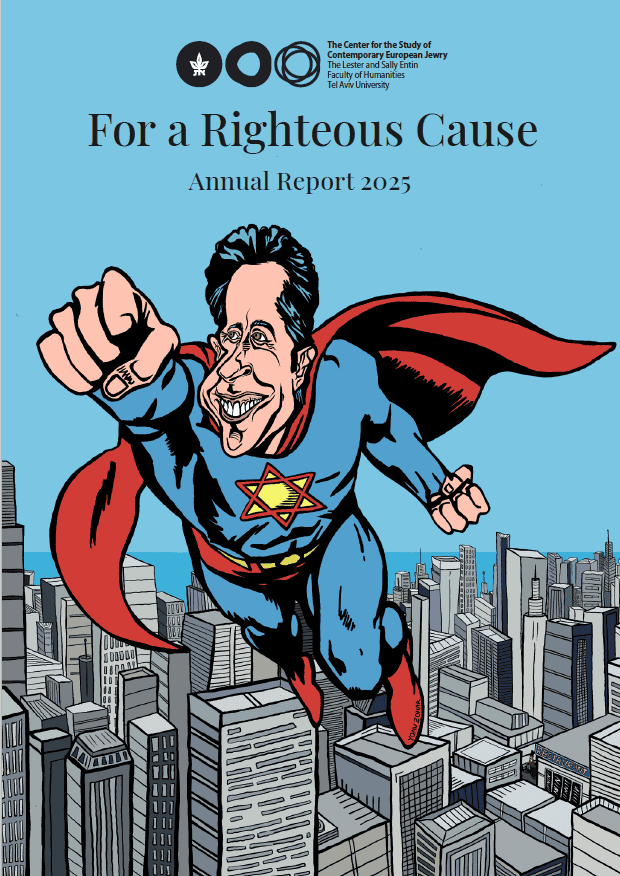The “For a Righteous Cause” report, published for a fourth year by the Center for the Study of Contemporary European Jewry at Tel Aviv University (TAU) in recognition of the annual International Holocaust Remembrance Day on Jan. 27, highlights an encouraging phenomenon: new exhibitions and museums commemorating the Holocaust and heroism that have opened or are under construction in Muslim countries.

These openings have not ceased even after the Hamas massacre in southern Israel on Oct. 7, 20923, and the escalation in antisemitic propaganda across the Arab world.
Among these are the Indonesian Holocaust Museum on the island of Sulawesi, the permanent exhibition on the Holocaust and Righteous Among the Nations “We Remember” at the Museum of the Crossroads of Civilizations in Dubai, and the Besa Museum and the Museum of the History of Albanian Jews, currently being built in Tirana and Vlora, Albania, respectively.
The 80-page report was written by a team of nine experts. It recognizes governmental and private initiatives commemorating the Holocaust and heroism, combating antisemitism and fighting racism in general, alongside policy suggestions for their improvement.
“Holocaust denial and the flourishing of antisemitic propaganda in the Muslim world are not just distortions of history but also encouragements to violence,” says Professor Uriya Shavit, head of the Center for the Study of Contemporary European Jewry. “The museums established and being established in the Muslim world are ‘a small amount of light,’ but this small amount is very important.”
“Direct or indirect support from Israel for these museums would harm them, but it is appropriate for international institutions to offer such support and insist on eradicating Holocaust denial from educational institutions in Muslim countries, as everywhere else,” Dr. Carl Yonker, senior researcher and project manager at the center, added.
The Indonesian Holocaust Museum in Sulawesi—in the world’s largest Muslim country—features written information alongside visual documentation of Nazi crimes, including a replica of a bunk bed from a concentration camp, as well as information about neo-antisemitism and Holocaust denial. The museum was opened two years ago by Ya’akov Baruch, a local rabbi of Dutch descent. Immediately after its opening, leading Islamic leaders called for its closure, accusing Baruch of promoting the Zionist narrative and whitewashing “Israel’s crimes.”
In a special interview for the report, Rabbi Baruch explained that he dealt with the harsh criticism through dialogue, during which he assured opponents that the museum is not connected to Israel or Zionism. This ensured its continued operation. To date, approximately 2,000 people have visited the museum. School classes visit it, but there are days when no more than one person purchases a ticket.
The permanent Holocaust memorial exhibition in Dubai was established by businessman and collector Ahmed Al Mansuri. It includes documentation of the history of Nazism and its crimes against Jews, alongside information about Muslims who saved Jews during the Holocaust. At the center of the exhibition is a poster in Arabic, English, and Hebrew quoting the Mishnah: “Whoever saves a single soul is as if they have saved an entire world.”
Al Mansuri said in an interview for the report that since the permanent exhibition opened two years ago, about 2,500 people from the UAE and Gulf states have visited, alongside thousands of local school students. Throughout its existence, even after Oct. 7, only one school group that came to the museum refused to visit.
Al Mansuri emphasized in the interview the uniqueness of Nazi crimes and the importance of Arab educators teaching about the Holocaust and its lessons. He noted that following Oct. 7, he has not received threats or demands to close the museum.
The Besa Museum, currently being built in Tirana, celebrates the ancient Albanian moral code that requires the protection of neighbors and guests. This code was central to Albania’s rescue efforts during the Holocaust.
One of the other articles in the report addresses the perception of Judaism by Jerry Seinfeld and the show “Seinfeld.” According to the article, episodes from the 1990s, particularly those dealing with Holocaust remembrance and antisemitism, reflected an era in which American Jews—most prominently, Seinfeld himself—did not feel like a minority group but rather as representatives of American identity itself.
This era has been shaken of late, as evidenced by Seinfeld’s firm stance (having previously avoided politics) in support of Israel after Oct. 7.
Additional articles in the report discuss the new and controversial National Holocaust Memorial Museum in the Netherlands; the story of Gibraltar’s Jewish community and its response to anti-Zionist protests in the small territory following Oct. 7; Jewish youth in Britain and America, and their identity questions in the shadow of war; and the journey of a young American from leading a white supremacist movement to fighting racism, in general, and antisemitism, in particular.
The report also features a special interview with Sir Max Hastings—one of Britain’s leading historians of the Second World War—calling for a radical change in the way the Holocaust is taught in Western schools. Hastings warns in the interview of the West’s unwillingness to confront the security challenges threatening its sovereignty and institutions.
The full report can be read here.

























